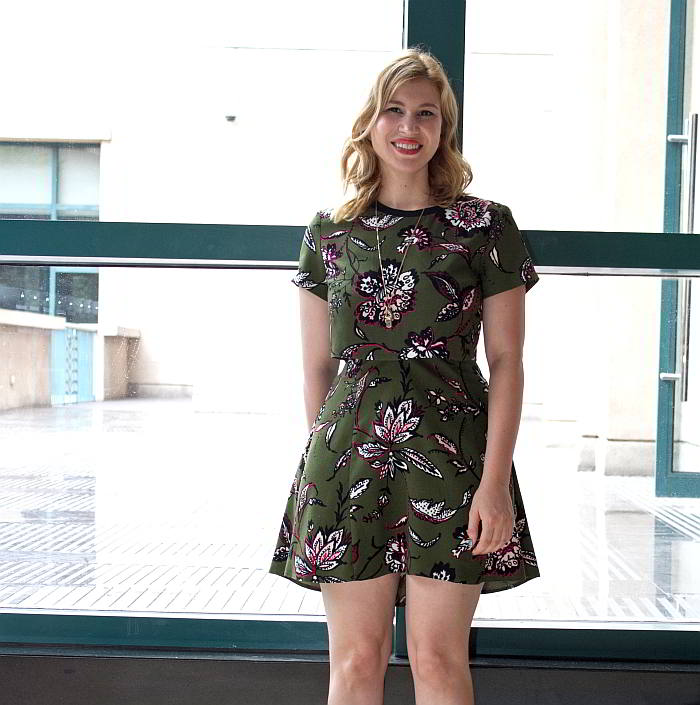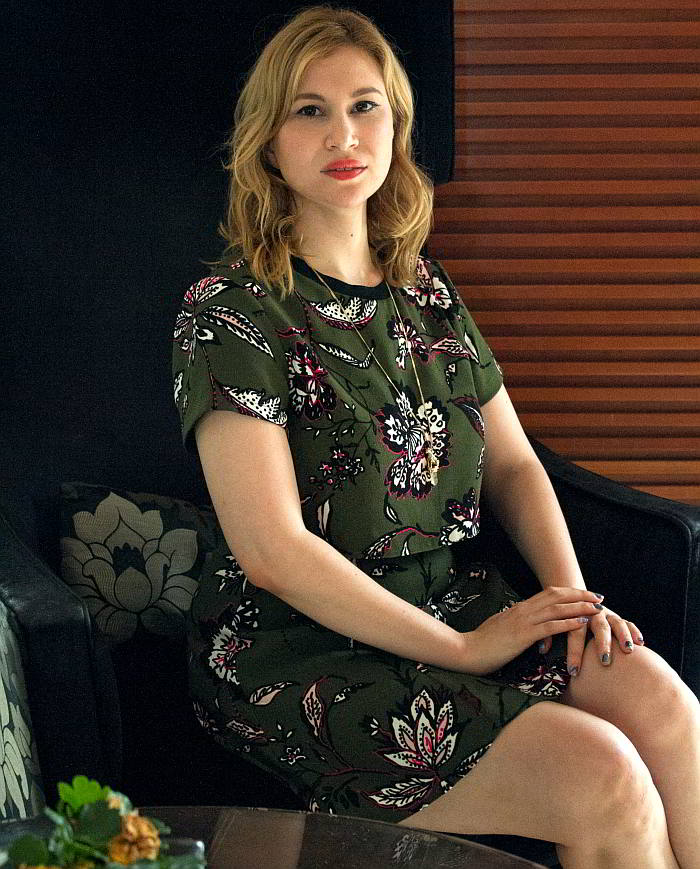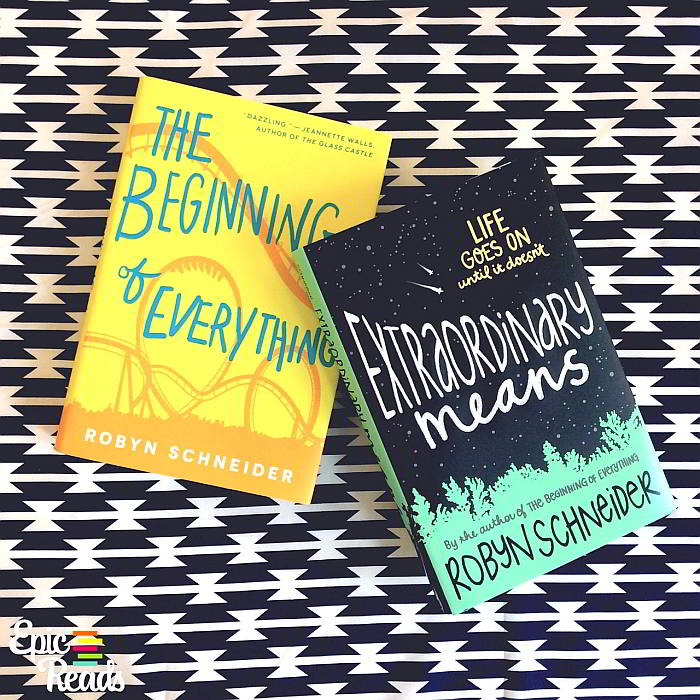
Robyn Schnieder (CDN PHOTO/ EDD BUENAVIAJE)
They say it takes only seven seconds to form the first impression— which means seven seconds to put your best foot forward and leave a good impression. While we come up with ways how to make seconds work in our favor, Robyn Schneider, a writer from Los Angeles, California, introduced a character in her book that warns that judgements formed at lightning speed is undeserved. And true enough, there is more to this young attractive lady in green floral dress talking about philosophy
and medicine. She could even pass for Sherlock Holmes’ right hand. (yes, she studied Sherlock Holmes and 18th century asylums).
Her best-selling debut novel, “The Beginning of Everything,” as well as the second one, “Extraordinary Means,” apparently stemmed from her multi-complicated plethora of thoughts building up in her mind. Though these stories were created out of nothing phenomenal in her daily life, there is nothing simple and naive in the love story of Ezra and Cassidy any more than there is in the dark and doomed first love of Lane and Sadie in her second book.
Robyn proved to be deeply observant, and contemplative of things that unfold even in the most ordinary day. It’s no wonder she likes anything random. Talking to this lady proved that having monologues with yourself or spacing out, or drowning into the world of your own never makes you anything less because you are different from others. Robyn is definitely more than just a “manic pixie dream girl.”
How did the story of Ezra and Cassidy come to you?
Ezra as a character is very emotionally autobiographical. I was thinking about a lot of things that happened in my life and I have a lot of questions about… you know… is it ever too late to go down a different path? If everybody thinks you’re one person but inside you feel different, how do you deal with that? So I wanted to write about these themes that I was dealing with and I wanted to write about them in a way that was fiction. So I decided… Oh! I’ll write about a boy going through a lot of the same. And then Cassidy is a way that people sometimes see me that I am not proud of. They see me as this “manic pixie dream girl” and I wanted to write a cautionary character about how it’s never wise to misrepresent yourself because you don’t have emotionally honest relationships, and how that can really hurt you when you encounter someone who is really worth having.
Do you always see yourself in the characters of your books?
Not anymore. I think I was just going through this period when I didn’t know what I was to be yet. I was studying medicine and I was writing this novel after school. It was very much a way to work through my own thoughts. Now that I’ve become this full-time writer, I think I’m writing fiction that’s a lot for they’re for my own experience. But I didn’t know that anybody would read this book. It was just really something that I was using to answer my own questions through fictional characters.
If we were to hear your thoughts, how would they usually go?
I’ve always thought I have this weird inner monologue. I’ll be sitting silently in a room and the things going through my head are just ridiculous! (Laughs). I was just thinking about this the other day about how unfair it is for women… that they have to be pregnant and nurse babies. I was thinking about this while I was having breakfast because there were so many children in the hotel. How women have to be both like the oven and the refrigerator! And I thought, well, what if a man can also nurse babies, wouldn’t that be a different way to grow up? The relationship would be so different I think there must be some alien culture that is horrifying that men don’t nurse babies, right? This was going through my head and I was having this charming conversation at breakfast with Katie (Cotugno) like, let’s go swimming later, but this is going on in my head! I really need to write so I get this stuff out of my brain and find use for it because it never shuts off! (laughs).
Do you keep a journal?
I don’t. I like to write stories. I don’t like to write truths about myself. I don’t to have a chronicle about my darkest moments. (Laughs). I want to make able to do something good from them.
But what would your journal be like if you have one?
It probably would be a naive book that is unintentionally funny. But I come to think of it, now we have blogs as journals so there is always some aspect of it that as a performance and never just for you.

Robyn Schnieder
Was it hard to write Ezra being from a male point of view?
No, not at all. I think it would be much harder to feel what it would be like to be a 16-year-old than it is to be a different gender. Teens today were born in the year 2000. It was more difficult to write more authentically from the point of view of somebody who was born in a different millennium.
Would you agree that the struggles a teen goes through are the same and universal?
I think experiencing first is already very universal and then the struggle there is very universal. Just what people grapple with as they grow up and as they go into the world with questions. Who am I and what does this mean to me? I think particularly now there’s so many cultural things that have shrunk down, like the people in their 20s and 30s listen to the same music as teenagers and shop the same stores, like people in their 30s go to the N’Sync concert. It’s very interesting to never graduate from the things that are part of your childhood and to have them stay with you.
Who else in the family writes?
I’m told that my grandfather, my mother’s father, that he was a wonderful writer. He was drafted into World War II and then he went to Law school on the GI bill. He always secretly wanted to be a writer and he was going to move out to Hollywood to write screenplays, but he had three children and it wasn’t a great move so he never did that.
Everyone in the family has been really encouraging because it’s a dream that my grandfather had but never got to realize so I made this impractical choice to pursue the same thing. I think it’s always been in our history to be a writer but I’m the only who is brave or crazy enough to pursue it.
How did you decide to take up medicine as a graduate student?
It was supposed to be the practice of medicine but I just didn’t finish it. (Laughs). My master’s degree is Bioethics. It’s the philosophy and history of practicing medicine. I would study like what is a hospital and history of medical school, and the standardization of medical practice and licensing. The idea of when did people start treating mental illness and when was that curable as opposed to being locked up in a prison, so yeah, those kinds.
Did this reflect in your book, “Extraordinary Means?”
When I started writing “Extraordinary Means,” I just started studying medicine and I was always interested in these stories about tuberculosis.
Why?
Because we kind of laugh at them culturally. We laugh at the idea of somebody with whatever consumption is, like coughing up blood and being so beautiful and delicate like “Moulin Rouge.” That kind of thing. And everybody’s kissing her and no one was thinking it’s contagious, don’t do that! Even in “Les Miserables.” In a lot of Mizaki movies too, like in “The Wind Rises,” they go to sanatoriums.
And it seems like we just wave this illness with a casual dismiss.
Right! Because this isn’t current. We just see it as this old weird historical thing of ladies swooning in their Victorian gowns and you don’t think that this is a real illness. Once I realized this is massive contagious illness that struck so many people down. I started thinking, why is it romanticized in fiction? Then I realized it was a history. It was this idea at the time we realized what tuberculosis was and that it was contagious, people stopped writing about it. They had only written about it as this mystery but never from the perspective of modern medicine.
How did you fit this issue into your YA book?
I think these kids in the book find a lot of humor in their situation because it’s not about dying; it’s about living with this uncertainty. They go and get butter beer lattes in town and they sneak out into these movie nights like a toga party, and they’re always joking around. There is this grimness to the book. I had written the first few chapters and I didn’t know what I really needed to say about tuberculosis or illness or living with this uncertain future. Then I found out that a friend of mine had died. I found out on Twitter, it was a retweet that I saw, and I clicked on his Facebook profile and I watched it turned into a memorial wall. It freaked me out how technology let us sit in the front row of somebody’s online funeral. Whether we think we’re attending a funeral or a social media party, we never know how these things can just show up on the Internet.
So I started thinking about it as a teenager where your whole life is lived on online via social media or your phone, what do you do if you have some illness that might be your downfall. Do you pre-emptively disconnect? Do you shut down? What do you decide that you want to leave behind? That’s a question that the kids ask in the books. There’s this one scene I wrote which is really cathartic for me after having experienced that. It’s when they start joking about if they had left their Facebook accounts open like the final Facebook status their parents would leave for them. How horrible and cheesy they would be.
Isn’t there supposed to be a best friend or someone you trust whose job is to delete all your social media accounts or private messages or burn journals when you die?
Oh, they have! They have a deal with each other about this. (Laughs). They have a pact. If I’m going to die I’m going to shut down these things and please take my porn and hide it, and burn my journals, and delete all of the unfinished songs that I haven’t recorded properly so nobody puts them out into the wall. They have this deal to clean up each other’s footprints.
Your book has the same effect as Kazuo Ishiguro’s “Never Let Me Go” which is dreadful and tragic.
I read the book and it’s astounding! It tricks you because you then realize the truth of where they are and what’s wrong with these things. I was so interested in being a little doomed than futureless in a coming of age story where you never grow up.
What I really love about it is that it is this story that a girl is relating to you about growing up at this boarding school and she doesn’t realize how horrifying the story is as she tells it to you. So there’s this disconnect between what is really happening and what she thinks she’s explaining. I wanted to do a bit of that in this book. I wanted you to be uncertain in the beginning whether Lane has arrived at a boarding school or a medical facility or mental hospital. Where is he? He’s being deliberate about avoiding that question. For that answer to feel very shocking when he answers the question, and for the story to suddenly click into place, I loved how “Never Let Me Go “had that unease into it. I wanted to replicate a bit of that.
What’s your typical day like?
I am ambitious and stupid! (Laughs). I will come up with crazy things that I will do by lunch and accomplish none of it because I have Netflix on my computer.
I will wake up and usually either work out or go on internet, and you can guess which one I do more often. Spoiler! It’s not the work out. (Laughs). I like to dress, I don’t want to wear pajamas because I feel like that’s what you do on a sick day. I don’t want my career to be like being an invalid so I get dressed, and go to a coffee shop and write for a few hours. Then I work on different projects like a script for the rest of the day. I tend to write in the morning or afternoon.
Are you a spontaneous person?
I’m definitely a person whom my friends will text and be like… let’s make plans in an hour. And I’d be okay! I don’t like having to remember that next week I have to have a dinner. I would love it when someone asks, what’s your dinner plan? And I’d be like… nothing! I like the idea that I never have to look forward to something and be disappointed by it, that my day can always surprise me.
If there is a Robyn Schneider in some distant parallel world who is not a writer and not into medicine, what would she be?
Maybe she’d be a professor. I really love school. I’m so much like Hermoine. I always have to have my hand up and have the right answer. If this world has magic, I’d be a great wizard. Also, I always have this little part of me that loves acting. Maybe if I’m really brave in this other world and I’m not a wizard, then I’d be an actress.


